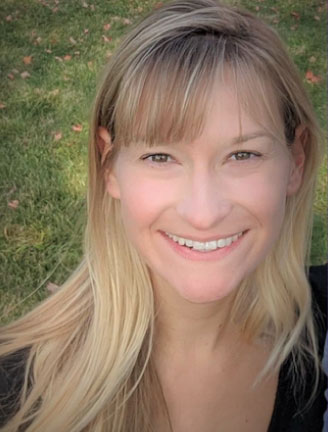Science Beyond the Lab
Alison Dufour (MBP ‘16) shares the responsibilities and challenges that come with taking complex scientific information and presenting it in a way any audience can understand.
 Alison Dufour (MBP '16) began her time in Northwestern Engineering's Master of Biotechnology Program (MBP) thinking she would graduate and land a job as a bench scientist. Her undergraduate degree was in biology, and she assumed completing grad school and then working in a lab would be her natural progression.
Alison Dufour (MBP '16) began her time in Northwestern Engineering's Master of Biotechnology Program (MBP) thinking she would graduate and land a job as a bench scientist. Her undergraduate degree was in biology, and she assumed completing grad school and then working in a lab would be her natural progression.
MBP introduced Dufour to new opportunities, specifically at the intersection of science and business. Today, at a time when misinformation has installed itself as a barrier to scientific understanding, Dufour takes complex ideas and efficiently and accurately distills them into easily accessible content.
Dufour is an account manager at AMICULUM, a global healthcare communications company where she's worked since 2019. She recently talked about the challenges of taking high-level scientific concepts and bioling them down for anyone to understand, as well as how her time in MBP prepared her for the work she does today.
What’s AMICULUM?
I like to think of our company as a group of scientific educators. We deliver communications and consultancy services to pharmaceutical, biotechnology and health technology companies worldwide. Our teams work to raise awareness of diseases and treatments, and we also educate and inform healthcare professionals about the benefits and risks of new therapies, all supported by scientific data.
How do you describe your role and responsibilities?
I manage two pharmaceutical accounts and oversee all project management activities for these teams. This involves being the primary point of contact with my clients, managing project finances and ensuring that our team delivers quality scientific content to our pharmaceutical partners. The projects I’ve been involved in include traditional publications, scientific platforms, healthcare professional training modules, patient educational materials and disease state education videos.
How do you undertake the complicated process of communicating scientific concepts in a way that is easy for anyone to consume and understand?
The complicated part lies in the initial understanding of a scientific dataset. If you’re not able to take away simple concepts, then you haven’t understood the science yet. I’m continually amazed by my medical writing colleagues who can take 400-plus pages of scientific data tables, craft a manuscript out of it, and have it reviewed by medical experts. It is quite amazing, actually. For me, my role does not allow me to burrow that deep into the details, but I’ve been trained to know a little about a lot of things, usually managing anywhere from 15-30 scientific publications at a time.
How does the way you communicate change when you're presenting content for different audiences?
Our audience is perhaps the biggest influence on the projects we do, so much so that we don’t formally kick off projects until we identify who our target audience is. The reason is that scientific content and how it is crafted and communicated can change so drastically from audience to audience. For instance, educational material intended for a healthcare provider would look far different from one intended for a patient. When our team creates these materials, we may be working off of the same scientific dataset, but the outputs could be very different.
What are the biggest challenges you face?
The biggest challenge our team faces is the amount of scientific misinformation we see so regularly shared. Our team works diligently to communicate information that is backed by science. There is a very rigorous medical review process that is essential to follow, especially when communicating anything related to patient data. It may come as no surprise, though, that we regularly see a lot of scientific misinformation shared across social media and other channels (that is not peer-reviewed), so combatting any misinformation is a big challenge in our industry.
How did MBP prepare you for where you are today?
MBP prepared me for where I am today in more ways than I can count! Prior to joining MBP, I knew a great deal of biology and not much else. My first few months in, I was taking engineering classes, business classes and even classes on how to ‘think critically.’ The information overload those first few months not only exposed me to a lot of new material, but as a result, I also had to learn how to best manage my time and start prioritizing – skills that are so very relevant to my role today.
In what ways do you incorporate lessons learned from MBP into your day-to-day work?
Above all, MBP taught me about time and project management. The program provides so much information to absorb, and understanding how to prioritize, all while learning new information, was a skill I was able to gain and refine over time. MBP also taught me a lot about learning to work on diverse teams, where I gained valuable communication best practices. Lastly, MBP taught me to have a positive curiosity, especially in critically reviewing information and asking informed questions.

